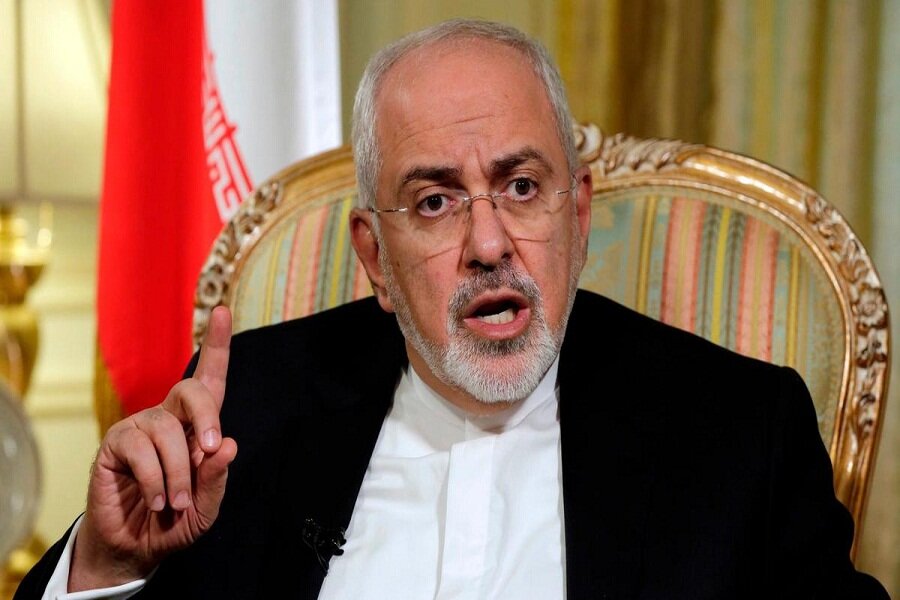Zarif lambasts ‘conceited interpretation’ of Resolution 2231

TEHRAN – Iranian Foreign Minister Mohammad Javad Zarif has dismissed a claim by U.S. Secretary of State Mike Pompeo about the nature of Iran’s missile program.
“Our missiles are not ‘designed’ for nukes, which we’re not developing,” Iran’s chief diplomat said in a tweet he posted on Friday.
Zarif stated that the U.S. and its allies are in no position to criticize the Islamic Republic’s missile program and lashed out at the West for making arms deals with the countries that are killing the Yemeni people.
In an interview with The Washington Times this week, Pompeo said, “The objectives (behind sanctions) are to change the behavior of the Islamic Republic of Iran. … No terror around the world, no expeditionary terror around the world, put your missile program back inside a set of constraints that had been identified in UN Security Council Resolution 2231 and … have a permanent commitment not to develop your nuclear program.”
“The US—which violated UNSCR 2231 in withdrawing from JCPOA—or its allies (in violation of its provision on normalizing economic relations w/Iran) are in no position to push a conceited interpretation of its missile provision while pouring weapons into hands that kill Yemenis,” Zarif states.
The UN Security Council Resolution 2231, which endorsed the 2015 nuclear accord between Tehran and world powers, calls on Iran "not to undertake any activity related to ballistic missiles designed to be capable of delivering nuclear weapons."
Under the nuclear deal, officially called the JCPOA, Iran undertook to put limits on its nuclear program in exchange for the removal of nuclear-related sanctions imposed against Tehran. However, U.S. President Donald Trump pulled his country out of the JCPOA in May 2018 and re-imposed harsh sanctions against the Islamic Republic in defiance of global criticisms.
The U.S. administration claims that Tehran had violated the JCPOA with a series of ballistic missiles tests over the past four years.
“The US—which violated UNSCR 2231 in withdrawing from JCPOA—or its allies (in violation of its provision on normalizing economic relations w/Iran) are in no position to push a conceited interpretation of its missile provision while pouring weapons into hands that kill Yemenis,” Zarif said in his tweet.
An American think tank said in April that it has found new data showing U.S. arms deals with Saudi Arabia and the UAE are "dramatically understated" and billions more than previously reported.
The data, collected by arms trade watchdog Security Assistance Monitor (SAM), shows the U.S. has struck at least $68.2 billion worth of deals with the two countries since they started their war in Yemen.
Zarif emphasized that the UN Security Council resolution does not enforces any prohibition on Iran’s conventional missiles.
French President Emmanuel Macron also on Thursday accused Tehran of making efforts to achieve nuclear arms, saying France and the U.S. both wanted to stop Tehran getting nuclear arms and new talks should focus on curbing its ballistic missiles program and on other issues.
In a Thursday meeting with the U.S. president, Macron listed four common priorities of the U.S. and France in addressing "Iranian behavior": preventing Iran from getting a nuclear weapon, reducing Iran's ballistic activity, containing Iran's regional activity and establishing peace in the region.
However, Iranian Foreign Ministry spokesman Abbas Moussavi rejected French calls for wider international talks over its nuclear program and said Macron's comments will be of no help to saving the nuclear deal and will just further deepen distrust among its signatories.
Meanwhile, during a meeting with heads of international news agencies on Thursday, Russian President Vladimir Putin once again stressed the importance of preserving the multilateral nuclear agreement, saying Moscow does not approve of "what is being done against Iran."
In reaction to Macron’s remarks, the Russian leader drew a line between Iran’s nuclear and missile programs and said, “Yes, someone may be concerned by Iran's missile programs. But that's a different problem.”
Leave a Comment